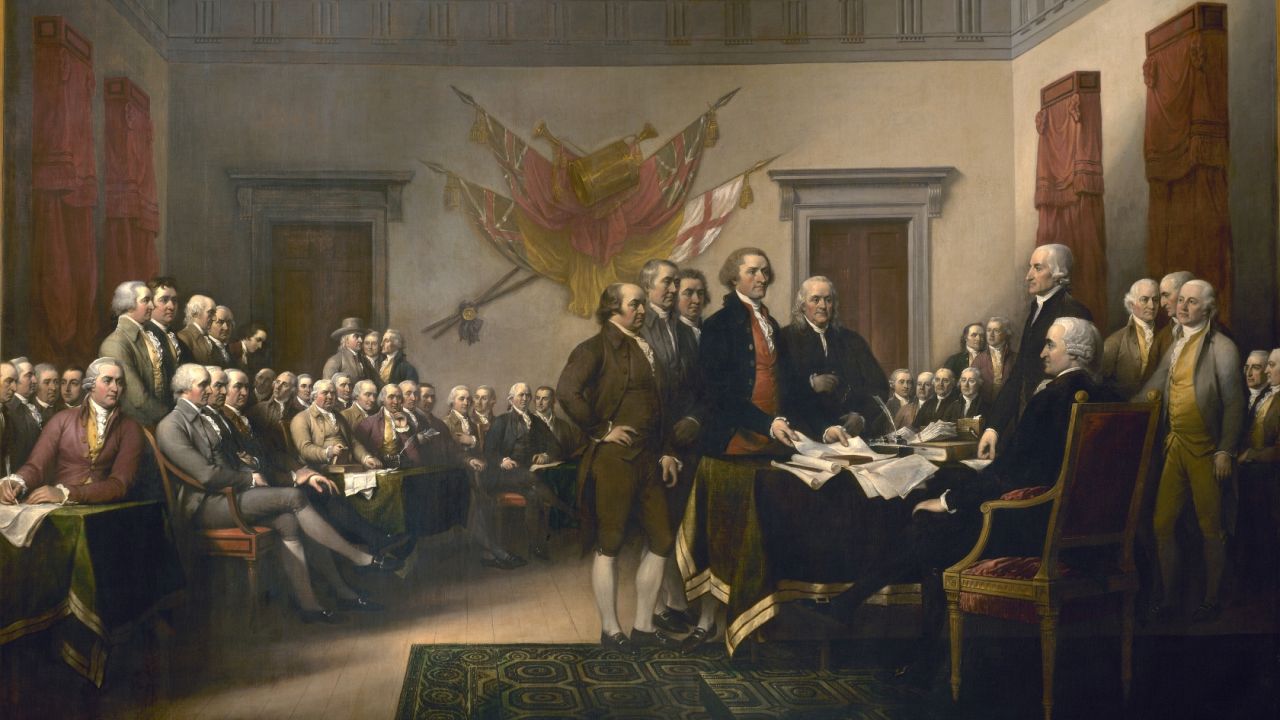
"We are radicals at heart. It is time we recognize it. It is time we embrace our radical history," writes Harvey Kaye. (The Declaration of Independence by John Trumbull /Wikimedia Commons)
The Trump administration is winding down as Joe Biden and Kamala Harris prepare to take office on Wednesday.
Trump will leave office with an approval rating of 34%, dismal by any measure. He is the first president since Gallup began polling never to break 50% approval. After the attack on the Capitol on January 6, the House of Representatives impeached him for a second time, and a majority of Americans think he should have been removed from office.
In the last days of his term, the area of Washington, D.C., around our government buildings has been locked down to guard against further terrorism. Our tradition of a peaceful transition of power, established in 1800, has been broken. There is a 7-foot black fence around the Capitol and 15,000 National Guard soldiers on duty in a bitterly cold Washington January. There are checkpoints and road closures near the center of the city, and 10,000 more troops are authorized if necessary. Another 4,000 are on duty in their states, protecting key buildings and infrastructure sites.
In the past two days, there have been more indications that members of the Trump administration were behind the January 6 coup attempt. Yesterday, Richard Lardner and Michelle R. Smith of the Associated Press broke the story that, far from being a grassroots rally, the event of January 6 that led to the storming of the Capitol was organized and staffed by members of Trump’s presidential campaign team. These staffers have since tried to distance themselves from it, deleting their social media accounts and refusing to answer questions from reporters.
A number of the arrested insurrectionists have claimed that they were storming the Capitol because the president told them to. According to lawyers Teri Kanefield and Mark Reichel, writing in the Washington Post, this is known as the “public authority” defense, meaning that if someone in authority tells you it’s okay to break a law, that advice is a defense when you are arrested. It doesn’t mean you won’t be punished, but it is a defense. It also means that the person offering you that instruction is more likely to be prosecuted.
The second impeachment, popular outcry, and continuing stories about the likely involvement of administration figures in the coup attempt seem to have trimmed Trump’s wings in his last days in office. He is issuing orders that Biden vows to overturn, and contemplating pardons (stories say those around him are selling access to him to advocate for those pardons), but otherwise today was quiet.
He has tried to install a loyalist as the top lawyer at the National Security Agency, either to burrow him in or to get the green light for dumping NSA documents before he leaves office; Biden’s team will fight what is clearly an attempt to politicize the position. Tonight, Census Director Steven Dillingham resigned after whistleblowers alleged that he and other political appointees were putting pressure on department staffers to issue a hasty and unresearched report on undocumented immigrants.
According to news reports, Trump is planning to leave Washington on the morning of January 20 and should be at his Florida club Mar-a-Lago by the time Biden and Harris are sworn in. The last president to miss a successor’s inauguration was Andrew Johnson, who in 1869 refused to attend Ulysses S. Grant’s swearing-in, and instead spent the morning signing last-minute bills to put in place before Grant took office.
There is a lot of chatter tonight about the release today of the 1776 Report guidelines on American history. This is the administration’s reply to the 1619 Project from the New York Times, which focused on America’s history of racism. As historian Torsten Kathke noted on Twitter, none of the people involved in compiling today’s 41-page document are actually historians. They are political scientists and Republican operatives who have produced a full-throated attack on progressives in American history as well as a whitewashed celebration of the U.S.A. Made up of astonishingly bad history, this document will not stand as anything other than an artifact of Trump’s hatred of today’s progressives and his desperate attempt to wrench American history into the mythology he and his supporters promote so fervently.
But aside from the bad history, the report is a fascinating window into the mindset of this administration and its supporters. In it, the United States of America has been pretty gosh darned wonderful since the beginning, and has remained curiously static. “[T]he American people have ever pursued freedom and justice,” it reads, and while “neither America nor any other nation has perfectly lived up to the universal truths of equality, liberty, justice, and government by consent,” “no nation… has strived harder, or done more, to achieve them.”
America seems to have sprung up in 1776 in a form that was fine and finished. But, according to the document’s authors, trouble began in the 1890s, when “progressives” demanded that the Constitution “should constantly evolve to secure evolving rights.” It was at that moment the teaching of history took a dark turn.
The view that America was born whole, has stayed the same, and is simply a prize worth possessing reminds me of so much of the world of Trump and the people around him, characterized by acquisition: buildings, planes, yachts, clothing, bank accounts. Trump and his people seem to see the world as a zero-sum game in which the winners have the most stuff, and America is just one more thing to possess.
But there is a big difference in this world between having and doing.
America has never fully embodied equality, liberty, and justice. What it has always had was a dream of justice and equality before the law. The 1776 Report authors are right to note that was an astonishing dream in 1776, and it made this country a beacon of radical hope. It was enough to inspire people from all walks of life to try to make that dream a reality. They didn’t have an ideal America; they worked to make one.
The hard work of doing is rarely the stuff of heroic biographies of leading men. It is the story of ordinary Americans who were finally pushed far enough that they put themselves on the line for this nation’s principles.
It is the story, for example, of abolitionist newspaperman Elijah P. Lovejoy, murdered by a pro-slavery mob in 1837, and the U.S. soldiers who twenty-four years later fought to protect the government against a pro-slavery insurrection designed to destroy it. It is the story of Lakota leader Red Cloud, who negotiated with hostile government leaders on behalf of his people, and of his contemporary Booker T. Washington, who tried to find a way for Black people to rise in the heart of the South in a time of widespread lynching. It is the story of Nebraska politician William Jennings Bryan, who gave voice to suffering farmers and workers in the 1890s, and of Frances Perkins, who carried his ideas forward as FDR’s Secretary of Labor and brought us Social Security. It is the story of the American G.I.s, from all races, ethnicities, genders, and walks of life who fought in WWII. It is the story of labor organizer Dolores Huerta, co-founder of the National Farmworkers Association, and Fannie Lou Hamer, who faced down men bent on murdering her and became an advocate for Black voting. It is the story of President Dwight D. Eisenhower, who 60 years ago this week warned us against the “military-industrial complex.”
And it is, of course, the story of the Reverend Dr. Martin Luther King, Jr., whose life we celebrate today. King challenged white politicians to take on poverty as well as racism to make the promise of America come true for all of us. “Some forty million of our brothers and sisters are poverty stricken, unable to gain the basic necessities of life,” he reminded white leaders in May 1967. “And so often we allow them to become invisible because our society’s so affluent that we don’t see the poor. Some of them are Mexican Americans. Some of them are Indians. Some are Puerto Ricans. Some are Appalachian whites. The vast majority are Negroes in proportion to their size in the population…. Now there is nothing new about poverty. It’s been with us for years and centuries. What is new at this point though, is that we now have the resources, we now have the skills, we now have the techniques to get rid of poverty. And the question is whether our nation has the will….” Just eleven months later, a white supremacist murdered Dr. King.
These people did not have a perfect nation, they worked to build one. They embraced America so fully they tried to bring its principles to life, sometimes at the cost of their own. Rather than simply trying to own America, the doers put skin in the game.
Today, the Trump administration issued the 1776 Report that presented the United States of America as a prize to be possessed. And yet, the country is demonstrably still in the process of being created: tonight, there are 15,000 soldiers in the cold in Washington, D.C., defending the seat of our government against insurgents.
We are pleased to be presenting daily posts from Heather Cox Richardson’s “Letters From an American” email newsletter. You can sign up to receive it in your inbox here.




